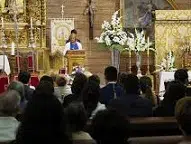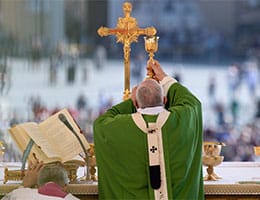 The notion of mass is used in Catholicism to refer to a celebration led by a priest where the sacrifice of Jesus Christ is renewed . The clergyman, representing Christ , expresses a formula that produces the transubstantiation of the host and the wine, converting them into the body and blood of the son of God .
The notion of mass is used in Catholicism to refer to a celebration led by a priest where the sacrifice of Jesus Christ is renewed . The clergyman, representing Christ , expresses a formula that produces the transubstantiation of the host and the wine, converting them into the body and blood of the son of God .
The mass, therefore, is the most important event in the Catholic religion. In it the sacrament of the Eucharist is specified, which allows the consecration of bread and drink.
According to Catholicism, the mass implies the renewal of the sacrifice made by Jesus , which is offered on the altar of the church under the species of wine and bread. When the faithful receive the Eucharist, communion occurs.
Throughout the development of the mass, various actions are carried out in addition to the rite of communion . There is a penitential act through which the priest invites those attending to repent, offerings are made and different prayers and prayers are said.
Let's see below the different parts of the mass in detail.
Initial Rites
These are rites that prepare the faithful for the word of God and the celebration of the Eucharist.
* entrance procession : believers arrive at the church and prepare to celebrate the mystery of their faith , singing together;
* initial greeting : after the priest kisses the altar and crosses himself, he greets those present;
* penitential act : one asks the Lord for forgiveness for one's faults with a humble attitude;
* glory : God is praised in recognition of his holiness and the need for his presence;
*collective prayer : the priest offers a prayer to the Father on behalf of all the faithful and through it he collects everyone's intentions.
Liturgy of the Word
Listen to the word God and respond through singing , meditation and prayer.
* first reading : the history of Israel and its prophets, as expressed in the Old Testament;
* psalm : meditation through prayer or singing a psalm;
* second reading : accounts of the apostles in the New Testament;
* gospel : the Hallelujah is sung to give rise to the proclamation of the mystery of Jesus Christ, after which the response is "Glory to you, Lord Jesus";
*homily : an explanation of the Word of God by the priest ;
* creed : confession of faith;
* prayer of the faithful : I pray for my neighbor and their needs.
Liturgy of the Eucharist
* presentation of the offerings : the bread and wine are presented for transformation into the body and blood of Christ. A collection is taken up for the entire Church;
 * preface : a prayer to thank and praise God;
* preface : a prayer to thank and praise God;
* epiclesis : invocation to the Holy Spirit to transform the bread and wine;
* consecration : remembrance of the last supper quoting the words of Christ;
* acclamation : the central mystery of faith is acclaimed;
* intercession : it is requested for all the authorities of the Church, for the deceased and for the most needy;
* Our Father : the Lord's Prayer is prayed in preparation for communion;
* communion : the faithful approach to receive the body of Jesus with humility;
* prayer : you thank Christ and ask for help for life in communion.
Farewell rites
* blessing : the priest blesses those present;
* farewell and sending : the faithful return to their activities carrying the Word and the body of Jesus with them.
It is important to highlight that, for Catholics, attending mass every Sunday and on the so-called "holidays of observance" is an obligation . This duty is linked to placing God as the reason for existence and the need to carry out a Christian life in community, collaborating with the construction of the church .
Finally, it should be noted that the musical genre composed for a solemn mass (the sung mass in which the priest is together with other ministers) is called mass. Masses can be accompanied by different instruments or be a cappella .
